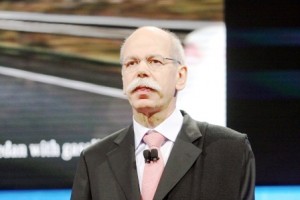Ever since he moved back to Stuttgart, after a 2005 tour of duty as Chrysler’s chief executive, Daimler CEO Dieter Zetsche has been dogged by the lingering controversies left behind by his predecessor, Juergen Schrempp. In addition, Zetsche has been challenged by a series of new issues that have left the company poorer and its strategic direction open to challenge.
Zetsche was supposed to offer stability and tranquility after Schrempp’s stormy reign as CEO – which ended in an angry annual meeting, in Berlin, during the spring of 2005, when shareholders went after Schrempp with the kind of zest the Red Baron’s Flying Circus used to reserve for chasing down British aircraft in World War I air battles. Schrempp’s few defenders in the hall were left pleading for civility.
By comparison, Zetsche’s tenure has been reasonably tranquil, though he has nonetheless been left balancing precariously on the high-wire without much of safety net.
Zetsche did end Schrempp’s infamous $36 billion North American adventure with Chrysler but some wonder why Zetsche ever bothered. It would probably have been cheaper to change the company’s name to Daimler AG and turn Chrysler into the American equivalent of Volkswagen’s Skoda – a down market company with brands appealing to cost-conscious consumer — at the same time letting Chrysler help on experiments with electric and hybrid vehicles while bringing in some extra cash flow from sales of trucks and Jeeps.
To satisfy the disgruntled German shareholders, however, Zetsche basically sold Chrysler for a song and on terms that can only be described as disadvantageous. But the pressure was on to get rid of the American side of the company as quickly as possible.
In fact, the huge Chrysler portion of the sign that sat atop the headquarters of DaiimlerChrysler Financial in Potzdammer Platz, in Berlin, disappeared immediately after the sale of Chrysler to Cerberus was approved by shareholders in October, 2007.
Daimler continues to pay for the botched “merger of equals,” notably last year when it had to fork over $600 million to the U.S. Treasury during the Chrysler bailout to cover shortfalls in its former American partner’s pension fund. In fact, a new report from the U.S. Government Accounting Office noted, this month, that Daimler could owe still more – perhaps $200 million – if the Chrysler pension fund begin to sink.
Then there is the $185 billion fine Daimler had to pay the US Justice Deparment and the SEC for both criminal and civil penalities connected to repeated violations of the foreign corrupt practices act. Daimler’s stone-faced PR staff played it straight by insisting that, yes, mistakes had been made, but stressing that the problem had been rectified and all the miscreants punished – either through demotions or firings. Perhaps, but the Feds pointed out that the wrong-doing had continued until 2008, long after Schrempp and his merry buccaneer crew had left the company.
Nor has Zetsche yet impressed observers in Germany, where the greatest number of Daimler AG’s shareholders live. Daimler lost a lot of money last year because of the recession and a new alliance with Renault-Nissan has been panned. (Click Here for details on that deal.)
Der Spiegel, one of Germany’s most influential sources of news and opinion questioned, “… is it possible for the German company to effectively work together with a partly state-owned Renault that…might put France’s political interests ahead of good business sense?”
This isn’t just a theoretical concern. It already happened in the case of the EADS, the maker of Airbus, when the French left other partners, such as Daimler, in the lurch, while responding to political, rather than business, pressures.
In addition, the next generation of small cars from Mercedes-Benz in the A and B class will be Renault products, under the skin, which could very well dilute the value of the Mercedes-Benz brand name, noted Der Spiegel, which also railed against the share cross-holdings approved as part of the deal.
While questions can be raised about Zetsche’s tenure, so far, it should be pointed out that his company has weathered the global economic downturn in reasonably good order, though not without setback. Earnings are down, as is the company’s net worth. And, in a surprise development, archrival Audi, the Volkswagen luxury brand, topped Mercedes to become the world’s best-selling luxury brand during the first quarter of this year.
Nonetheless, Zetsche was recently given a new contract extending his tensure for several more years. So far, despite the problems he and the company have faced, he continues to have the support of most of his board colleagues and shareholders. But as the once-popular Schrempp unhappily learned, support has a way of withering quickly once enough things go wrong.

